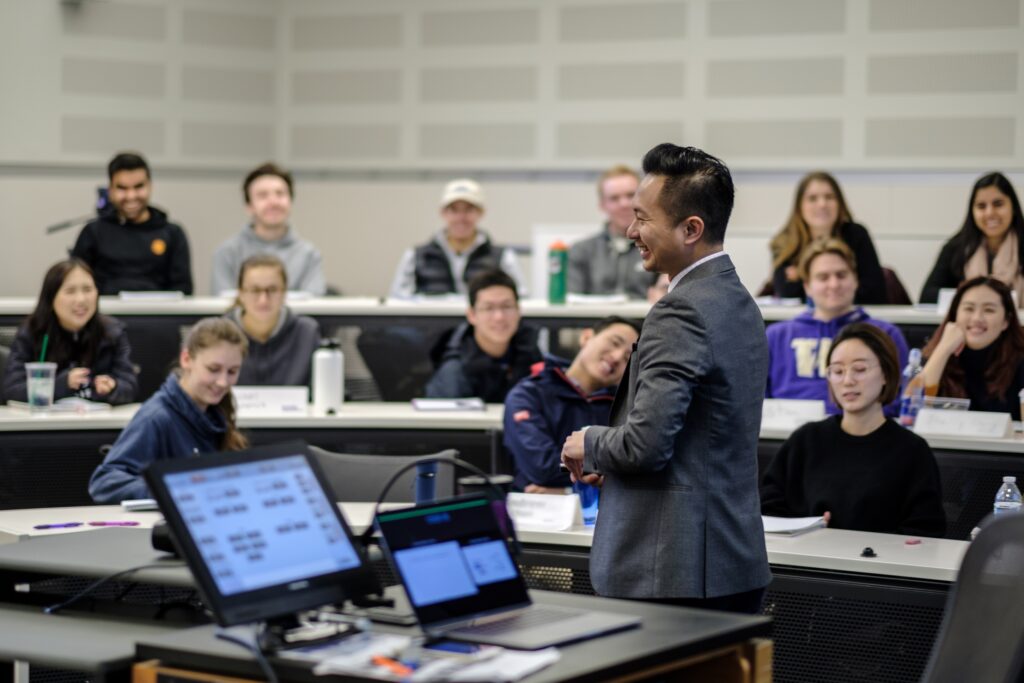New Research: The Thorny Issue of Workplace Touching
From high-fives to handshakes, Elijah Wee explores the complicated ways we respond in today’s workplace
Professional touching behavior at work – handshakes, fist bumps, a pat on the back – can support interpersonal connections. But at the same time, workplace touching can also be perceived as a health risk and prompt withdrawal behavior.
This is the focus of new research co-authored by UW Foster School of Business Assistant Professor Elijah Wee in the Research in Personnel and Human Resources Management journal. Wee and his co-authors asked: How can we better understand the implications of professional touching, and what should human resource managers know?
UW Foster School of Business spoke with Wee about the thorny issue of workplace touching.
What takeaways does your research into workplace touching offer business leaders?
Elijah Wee: This research focuses on intentional touching behavior between organizational members that falls within the boundaries of appropriateness and professionalism in the workplace, such as high-fives, and handshakes, which is an age-old form of physical communication in our daily work interactions.

Our theory highlights the physiological, mental, and behavioral consequences of professional touching behavior in the workplace. While physical touch in the workplace can signal social connections and closeness with others, it can also signal a potential source of diseases. We discuss two distinct systems that help individuals appraise whether the touching behavior is beneficial (e.g., a form of social validation, or support) or harmful (e.g., potential health risks).
What stood out for you in the research findings?
Elijah Wee: This work provides a holistic discussion on professional touching behavior in the workplace.
For managers and human resource practitioners who see little harm in this form of physical communication, our research makes a strong case for the potential negative physiological, mental, and behavioral consequences of touching. For others who believe that touching has no place in the modern workplace, our research shows how and why the lack of physical touch will weaken the social fabric of the organization.
What inspired you and your co-authors to study workplace touching?
Elijah Wee: We recognize that the professional touching behavior is a thorny issue in the workplace. We also believe that the COVID-19 pandemic will further complicate our understanding of touch, so we are motivated to investigate how employees might respond to professional touching behavior in today’s context.
Workplace touching is not your traditional research focus. What drew you to this topic?
Elijah Wee: I am fortunate to have collaborators who bring different expertise to our project! While the idea of physical touch is not in my area of research, I see the connection to my broader interest in belongingness as touch fulfills our need for belonging.
In this research, Wee partnered with colleagues Pok Man Tang (University of Georgia); Anthony C. Klotz (University College London); Joel Koopman (Texas A&M University); and Yizhen Lu (National University of Singapore).

About Elijah Wee
Named one of 2023’s Best Undergraduate Business School Professors by Poets&Quants, Assistant Professor Elijah Wee focuses his research on power dynamics, social status, and organizational transformation. He has been published in leading management journals including the Academy of Management Journal and the Journal of Applied Psychology and received numerous research awards. At the Foster School of Business, he teaches topics relating to leadership and organizational behavior, and power and status dynamics.
“A theory of professional touching behavior in organizations: Implications for human resource scholars and practitioners” – Pok Man Tang, Anthony C. Klotz, Joel Koopman, Elijah X. M. Wee, Yizhen Lu. Published in the Research in Personnel and Human Resources Management (2023).
